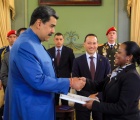The Ministry of Health wishes to advise the public of a confirmed imported case of Chikungunya Fever.
The case occurred in an adult visitor who travelled to The Bahamas from the Dominican Republic on June 29, 2014. His symptoms reportedly began the day before travel to The Bahamas. He was seen at the Princess Margaret Hospital on June 30, 2014 and was subsequently tested. A confirmed positive test was received on July 4, 2014. The patient has been treated and is presently recovering well.
Chikungunya was first reported in the Caribbean on the December 6, 2014. To date, twenty two (22) countries in the Caribbean have reported confirmed cases. Chikungunya is a viral illness transmitted by the bite of an infected Aedes Aegypti or Aedes Albopictus mosquito. The Aedes Aegypti mosquito is commonly found throughout The Bahamas and is known to transmit other diseases such as Dengue. Chikungunya can affect women and men of all ages.
Symptoms of Chikungunya include high fever, and severe joint pains in the hands and feet which can persist for several weeks. Other symptoms may include headache, muscle pain, joint swelling and rash. These symptoms usually appear 3-5 days after being bitten by an infected mosquito.
Treatment for Chikungunya is symptomatic or supportive and includes rest, the use of pain relievers such as Panadol, Tylenol or Calpol and plenty of fluids. The use of Aspirin is not recommended. Prevention measures include:-
- Avoiding mosquito bites, which will help to prevent further spread of the virus;
- Securely covering domestic water containers such as buckets and barrels;
- Properly discarding old tires, and containers that collect water e.g. bottles and cans; and
- Covering and/or sealing tanks, soak aways, garbage bins and cisterns.
To reduce mosquito exposure you can:-
- Use mosquito repellants on exposed skin;
- Wear long sleeve light colored clothing;
- Completely screen all doors and windows; and
- Sleep under mosquito nets and burn mosquito coils or coconut bark.
If you think you or your family member might have Chikungunya, please visit your doctor or the nearest health care provider. For more information, contact the Surveillance Unit, Department of Public Health at 502- 4790 or 502- 4776.





